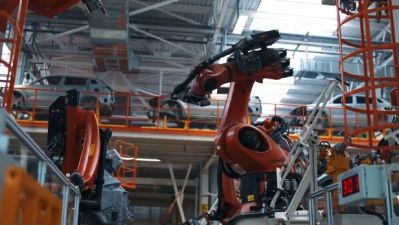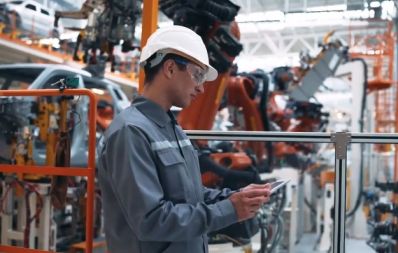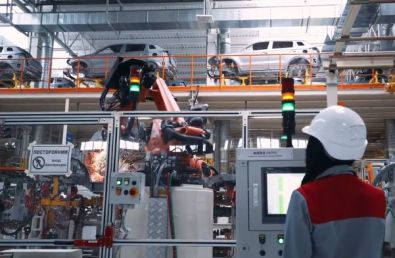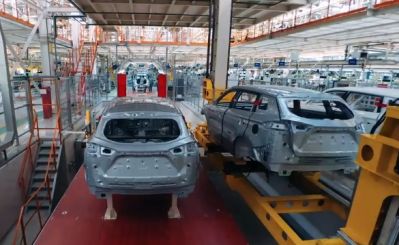Audi's Automated Inspections Make Industry 4.0 Factory More Profitable
Combining forces with Nebbiolo and Intel, German automaker Audi has automated and enhanced critical quality-control processes in its factories. Together, they have created a scalable, flexible platform solution, embracing advanced digital capabilities to increase efficiency and reduce costs.
Audi worked with Intel and Nebbiolo on a successful proof of concept experiment focused on improving the quality-control process for the welds on its vehicles. The experiment took place at Audi's factory in Neckarsulm, Germany, one of the company's two principal assembly plants. The Neckarsulm plant has 2,500 autonomous robots on its production line. Each robot is equipped with a tool of some kind, from glue guns to screwdrivers, and performs a specific task required to assemble an Audi automobile. Nine hundred of those robots carry welding guns to do spot welds that hold pieces of metal together.

Combining forces with Nebbiolo for edge software, Intel is taking analytics to the edge and helping German automaker Audi automate and enhance critical quality-control processes in its factories.
Audi assembles up to approximately 1,000 vehicles every day at the Neckarsulm factory, and there are 5,000 welds in each car. That's more than 5 million welds in a single day of production. To ensure the quality of its welds, Audi currently performs manual quality-control inspections. It is impossible to manually inspect 1,000 cars every day however, so Audi uses the industry's standard sampling method. A single car per day is sampled and inspected.
The new infrastructure based on Nebbiolo's Edge Software supports a hierarchical data analytics and machine learning architecture, with edge models iteratively refined by Audi's and Intel's Data Science teams, which enables the inspection of all the 5,000 welds per car, yielding accurate quality results for each weld within 18 milliseconds. The ultimate goal of inline quality control, with its unprecedented savings in cost and labor, is now attainable.

Working closely with Audi engineers and technicians, Intel created a scalable, flexible platform solution that Audi can use as the foundation for current improvements and future innovations.
This successful experience with the welding process has convinced Audi that this approach can be adopted not only to improve quality control for spot welding, but also as the foundation for other use cases involving robots and controllers such as riveting, gluing and painting. Audi already has plans to use the platform for other use cases at the Neckarsulm factory, and eventually intends to deploy predictive welding inspection and other solutions across all Volkswagen Group production facilities.
This announcement is a significant endorsement for a movement towards the modernization of automotive plants based on the progressive adoption of distributed and virtualized computing, featuring advanced data management capabilities and the implementation of cloud inspired software management models at the edge.
Nebbiolo's hardware agnostic, edge computing platform addresses many of the current Industrial Automation challenges. It virtualizes and converges hardware and software components and it provides centralized software lifecycle management for distributed applications. It supports modern software defined networking, distributed security, software SDK/APIs, IT-like data management, and opens the path to the future of Industrial Control. It enables the deployment of centrally orchestrated and distributed data connectivity, data management and advanced AI/ML based analytics capabilities across the Industrial Floor.

Audi has automated many production jobs in its factories, from spot welding to riveting, but its ultimate goal is to create smart factories and achieve an Industry 4.0 level of production.
According to Henning Löser, Senior Manager at the Audi Production Lab, the most compelling business outcome for Audi is how moving from manual inspections to an automated, data-driven process has allowed it to increase the scope and accuracy of its quality-control processes. "We are at the very beginning of collecting and analyzing our data," Henning Löser says. "As we continue this journey, there will be many more happy surprises and new opportunities for us."
Another key benefit of the new system and the precise inspections it enables is that Audi can be proactive and focus on avoiding problems rather than merely reacting to them. "Let's say we do an overall inspection of 5,000 or more welds on one car a day, and maybe 95% of those welds are good and 5% are not," Mathias Mayer, who leads automation technology planning at Audi, says. "In the future, we can focus on the 5%, because we know where they are in the factory and we can take action much sooner."

Audi assembles approximately 1,000 vehicles every day at the Neckarsulm factory, and there are 5,000 welds in each car.
"The value of putting the analytics platform at the edge is that it allows you to draw more data into it and look at correlations, causalities, and other interesting analytics -- even some you might not think of at first," says Brian McCarson, Vice President of the Internet of Things Group and Director of Industrial Systems Engineering and Architecture at Intel.
"Partnering with Intel to transform Audi's inline quality inspection of welds, from one car a day to 100% of cars produced is one of many ideal, real time use cases enabled by Nebbiolo's distributed edge platform," says Chandra Joshi, CEO at Nebbiolo Technologies. This project demonstrated how quickly a data science project can be converted from concept to production at scale through leveraging a converged platform.
Want more information? Click below.
Rate this article
View our terms of use and privacy policy ::m::